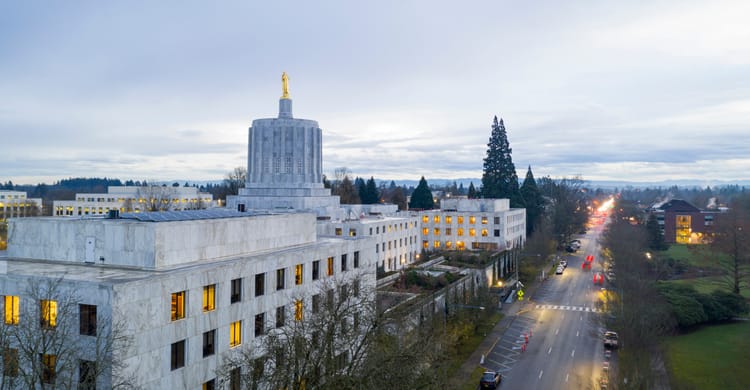Oregon Legislative Session Ends in Disarray

The Takeaway
Oregon lawmakers adjourned shortly before midnight on Friday, after scrambling to pass final bills and approve budgets, but fell short on what was expected to be the session’s signature policy: a sweeping transportation funding plan. Since the start, the 2025 legislative session was marked by chaos and uncertainty — some of it self-inflicted but much of it driven by shifting federal policy. Yet the most lasting impression may be the disarray of its final week, which eclipsed even the most turbulent sessions marred by walkouts. Rarely has a closing stretch left so many core issues unresolved. Unlike those past walkouts, the issue this time around was not keeping lawmakers in the building but, rather, getting a funding package out of it.
The Wheels Come Off
Dreams of a landmark transportation funding package collapsed in dramatic fashion during the final week of the session, despite — or perhaps because of — a flurry of eleventh-hour maneuvering. On Monday, HB 2025, the vehicle for the transportation funding plan, was rereferred from the floor back to the Joint Committee on Transportation Reinvestment for further amendments, signaling a faint but real possibility that Democrats might yet find a path forward. That same day, Senate President Rob Wagner (D-Lake Oswego) removed Sen. Chris Gorsek (D-Gresham) as chair of the Joint Committee on Transportation Reinvestment following an unusual outburst at a female colleague during the committee’s deliberations the previous week. In his place, Wagner appointed Sen. Khan Pham (D-Portland) as chair and added Sens. Lew Frederick (D-Portland) and James Manning (D-Eugene) to the committee, effectively increasing the party’s majority and ensuring the votes on a revised package.
By Tuesday, however, the pressure to resolve transportation funding had grown significantly. The legislature’s budget-writing committee approved a $6.1 billion base budget for the Oregon Department of Transportation (ODOT). It did so with the assumption that a broader funding package would follow. Without the new funds, agency leaders would face painful service reductions, including cuts to rural and mountain snowplow operations. That message struck a nerve with some Republican lawmakers, representing a dire safety concern for their constituents, even as they remained skeptical of the size and scope of the package.
On Thursday, Democrats unveiled a scaled-back funding plan that trimmed roughly $3 billion from the original cost. Among the changes was the removal of a controversial sales tax on vehicle purchases. Still, the revised package failed to win over key moderates, including one Democratic senator who publicly declared opposition on social media, seemingly ending any hope of Democrats uniting around a proposal. Although Democrats hold supermajorities in both chambers — 36 in the House and 18 in the Senate — passing tax increases without support from the minority party requires unwavering unity among their own members. That proved elusive. With intraparty divisions unresolved, Democratic leaders appeared to acknowledge the collapse of the package by Friday afternoon, pivoting instead to a stopgap funding measure.
Late on Friday, the House Rules Committee unveiled a pared-down proposal to raise the state gas tax by three cents to prevent cuts within ODOT. Gov. Tina Kotek (D) delivered a rare personal appeal to lawmakers, warning that without the increase, she would be forced to lay off hundreds of frontline transportation workers. When the bill arrived on the House floor, however, Republicans refused to waive procedural rules to allow a vote, putting the final nail in the coffin of transportation funding for the session.
Republicans were quick to take a victory lap for blocking the single largest tax increase. However, like most political storylines, the reality is more complicated. In truth, it was moderate Democrats who torpedoed the sweeping $14.6 billion and $11.6 billion proposals, splintering the supermajority and leaving leadership without the votes to proceed. Republicans did draw a clear line on the stopgap funding measure, which would have spared layoffs and service cuts. By denying the vote, Republicans may have handed themselves a future political liability by tying themselves to job losses, stalled road maintenance, and potential safety issues, particularly in the rural districts many of them represent.
A Flurry of Final Decisions
While transportation dominated headlines throughout the week, it was far from the only issue lawmakers wrestled with during the final days of the session. The breadth and pace of late-session activity underscored how much unfinished business remained heading into the home stretch.
On Wednesday, the House Rules Committee held a public hearing on a proposal from House Republican Leader Christine Drazan (R-Canby) to delay implementation of the state’s new campaign finance limits — a bipartisan agreement reached during last year’s session. The amendment followed a letter from Secretary of State Tobias Read (D), who raised concerns about ambiguous language in the law and his office’s ability to successfully implement the rules by January 1, 2027. While there seemed to be an agreement that fixes were necessary, Drazan’s proposal went further, delaying enforcement until the 2032 election cycle — a move that would push reforms off for two more gubernatorial election cycles. After public backlash from good government groups, the delay effort was quietly abandoned.
Lawmakers also finalized a wildfire funding package that includes a new tax on synthetic nicotine products, such as Zyn pouches, and diverts interest earnings from the state’s Rainy Day Fund to support fire mitigation and suppression. Separately, in a rare move on Tuesday, the House used a floor “pull” to revive and advance a bill repealing Oregon’s controversial wildfire hazard maps. The repeal measure, long a point of contention in fire-prone communities, now heads to the governor’s desk.
Gun policy took a quieter role this session, but it still surfaced in the final week. On Wednesday, the House effectively killed a proposal to create a licensing program for firearm dealers through the Oregon Department of Justice. However, another bill passed that bans bump stocks and gives local governments more control over whether to allow firearms, including those licensed for concealed carry, on their premises.
And amid it all, lawmakers closed the books on the state budget. In the waning hours of the session, they set aside funds for pay increases for public employees and allocated funds for the Emergency Board, which convenes during the interim for budget matters. They also approved the session’s largest spending bill, known as the “Christmas Tree” bill, a $1 billion package of one-time appropriations for district projects and leadership priorities. But this year, the mood around the tree seemed subdued, with several lawmakers quietly quipping that Santa skipped their districts entirely.
Portland’s Tax Burden Comes into Focus
On Tuesday, during the Senate Finance & Revenue Committee’s final meeting of the session, lawmakers unveiled a surprise amendment that would have stripped Multnomah County of its authority to impose a local income tax — a direct challenge to the county’s voter-approved Preschool for All initiative. Backed by Gov. Kotek, the proposal arrived with the urgency of must-pass legislation but ultimately ran out of time.
The Multnomah County tax, passed in 2020, applies to high-income earners and was designed to fund universal preschool. In the years since, however, the tax has drawn sharp criticism for its administrative complexity and for exacerbating Portland’s so-called economic “doom loop.” Business groups and economists, including the Office of Economic Analysis, have warned the exodus of high earners from the metro area poses a growing threat to Oregon’s tax base, which relies heavily on personal income taxation.
In a sharply worded statement this week, Gov. Kotek made clear she believes the county tax needs reform. “The County must walk and chew gum at the same time – continue to serve the children it is serving, amend the tax, and fix the program before the next tax year to reduce the burden on Multnomah County residents,” she said. The governor has also floated the idea of a statewide alternative, signaling a broader interest in a legislative conversation about preschool funding and, ultimately, a new state funding mechanism.
The discourse over the county tax reveals a deeper point of contention over taxing authority. Currently, the Portland area has the second-highest state and local tax burden in the country, behind only New York City. As part of the legislative transportation funding proposal, lawmakers considered tripling a statewide payroll tax from 0.1 percent to 0.3 percent, a substantial increase in a tax based on gross income. If passed alongside Portland’s existing taxes, the change would have made the state’s largest city the most taxed locality in the country. Some lawmakers may embrace taxing the wealthy, but only when they are holding the pen.
Looking Ahead
The past six months have put the “long” in Oregon’s long session. And while it’s a relief to finally catch a breath, the work of this session feels far from finished. In a press briefing this morning, Gov. Kotek singled out Republican leaders for blocking the stopgap transportation funding bill. She delivered a blunt message to lawmakers: “Your work is not done.”
After most long sessions, legislators head home to quietly regroup. It’s unclear whether this summer will offer that luxury. The collapse of the transportation package leaves a gaping budget hole, and pressure to patch it will only grow. A special session is no longer a distant possibility; it could reopen unresolved fights or spark entirely new ones.
The national politics of late also adds another layer of uncertainty for a special session. As Congress races to complete President Trump’s “One Big Beautiful Bill” of tax and spending cuts before the Fourth of July, the legislature could face mounting decisions over state taxes, the budget, and programs affected by changes in federal policy or spending. For now, everyone may want a quiet summer. But odds are, the Capitol’s lights will be back on before the year is out.





